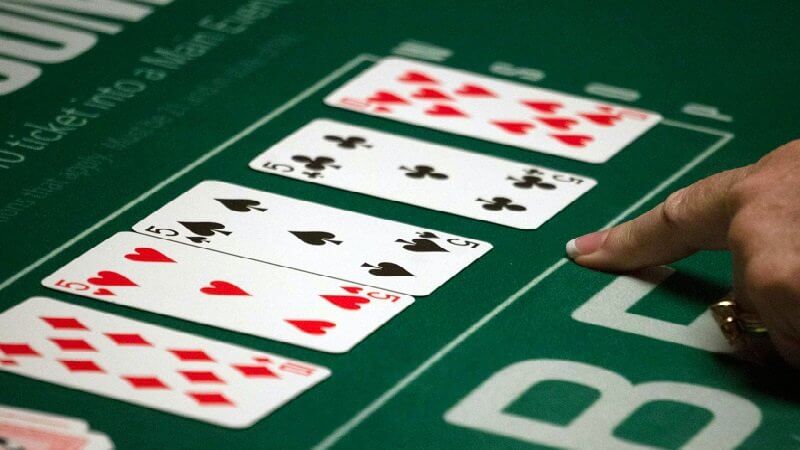Published on: 29/04/2023
Guide on How To Play Omaha Poker
Omaha poker has steadily gained popularity over the years as a thrilling and strategic alternative to Texas Hold’em. Omaha Poker appeals to casual players and seasoned professionals with its unique gameplay mechanics and increased action. The game has become a staple in poker rooms and online platforms, giving players an exciting way to test their skills and compete for substantial prize pools.
This article serves as a comprehensive guide on how to play Omaha poker, covering the basic rules, hand rankings, strategies, and tips to help beginners master this exciting poker variant. We will also discuss the differences between Omaha poker and Texas Hold’em, the concept of Omaha poker high low, and the best Omaha poker sites for playing online. By the end of this guide, you will have the knowledge and confidence to start playing Omaha poker and enjoy the game’s unique challenges and rewards.

What is Omaha poker?
Omaha poker is a popular community card game similar to Texas Hold’em. In Omaha poker, each player receives four hole cards instead of two, and they must use exactly two of their hole cards and three of the community cards to make the best five-card hand. This fundamental difference makes Omaha poker a more complex and action-packed game than its Texas Hold’em counterpart.
Differences Between Omaha Poker and Texas Hold’em.
There are several key differences between Omaha poker and Texas Hold’em:
- Hole cards: In Omaha, players are dealt four hole cards, whereas, in Texas Hold’em, they receive only two.
- Hand construction: In Omaha, players must use exactly two hole cards and three community cards to make their best five-card hand. In Texas Hold’em, players can use any combination of their hole cards and community cards to create their hand.
- Hand strength: Due to the increased number of starting hand combinations, Omaha poker generally sees stronger hands at showdown compared to Texas Hold’em.
The Rules of Omaha Poker
- Each player is dealt four private hole cards face down.
- The first round of betting, known as the pre-flop, begins with the player to the left of the big blind.
- The dealer places three community cards face up in the center of the table, known as the flop.
- The second betting round begins with the player to the dealer’s left.
- The dealer places a fourth community card, called the turn, face up on the table.
- The third betting round commences, starting with the player to the dealer’s left.
- The dealer reveals the fifth and final community card, the river.
- The final betting round occurs, beginning with the player to the dealer’s left.
- If two or more players remain after the final betting round, a showdown occurs, and the player with the best five-card hand, using exactly two hole cards and three community cards, wins the pot.
Understanding Omaha Poker Hands
Omaha poker hands follow the same rankings as in Texas Hold’em, with a few minor differences in hand strength due to the unique rules of the game. The hand rankings, from highest to lowest, are as follows:
- Royal Flush: A, K, Q, J, 10, all in the same suit
- Straight Flush: Five consecutive cards of the same suit, e.g., 5, 6, 7, 8, 9 of hearts
- Four of a Kind: Four cards of the same rank, e.g., four 8s
- Full House: Three cards of one rank and two cards of another rank, e.g., three 5s and two 9s
- Flush: Five cards of the same suit, not in sequence, e.g., A, J, 10, 6, 3 of spades
- Straight: Five consecutive cards of different suits, e.g., 5, 6, 7, 8, 9
- Three of a Kind: Three cards of the same rank, e.g., three 10s
- Two Pair: Two cards of one rank and two cards of another rank, e.g., two 4s and two 7s
- One Pair: Two cards of the same rank, e.g., two Aces
- High Card: The highest card in the hand when no other ranked hand is present
The Importance of Hand Selection in Omaha Poker
Hand selection is crucial in Omaha poker due to increased starting hand combinations. While playing a wide range of hands may be tempting, disciplined hand selection is key to long-term success in Omaha. Strong starting hands in Omaha typically include:
- Double-suited hands: Two pairs of suited hole cards increase the chances of hitting flushes.
- High pocket pairs: High pocket pairs, like A-A and K-K, provide a solid foundation for building strong hands.
- Connecting cards: Hands with consecutive hole cards, such as 9-10-J-Q or 6-7-8-9, offer potential for straights.
By focusing on premium starting hands, players can increase their odds of making strong hands at showdown and improve their overall performance in Omaha poker.
Omaha Poker High Low
The Concept of Omaha Poker High Low
Omaha poker high low, also known as Omaha Hi-Lo or Omaha 8 or Better, is a popular variation of the standard Omaha poker game. The main difference lies in how the pot is divided at showdown. In Omaha high low, the pot is split between the player with the highest hand (the high hand) and the player with the lowest hand (the low hand), provided the low hand qualifies as an 8 or better. This means that the low hand must have five unpaired cards with a value of 8 or lower.
How Omaha High Low Differs From Standard Omaha Poker
- Pot splitting: In standard Omaha poker, the pot goes to the player with the highest hand. The pot is divided between the highest and lowest qualifying hands in Omaha high low.
- Hand construction: Omaha high-low players must construct two hands: high and low hands. Both hands must be created using two-hole cards and three community cards.
- Low hand qualification: A low hand must consist of five unpaired cards with a value of 8 or lower to be eligible for the low portion of the pot.
- Strategy: Omaha high low requires players to adapt their strategies to account for high and low hands, making the game more complex and strategically challenging.
By understanding the unique rules and strategies of Omaha poker high low, players can enjoy an even more engaging and challenging poker experience.
Omaha Poker Strategy

Key Principles of Omaha Poker Strategy
When learning how to play Omaha poker, nothing is more important than a strategy.
- Hand selection: As mentioned earlier, focusing on strong starting hands increases the odds of making winning hands at showdown and improves overall performance.
- Reading the board: Pay close attention to the community cards to identify potential straights, flushes, and full houses, as well as the possibilities for low hands in Omaha high low.
- Drawing to the nuts: In Omaha poker, drawing to the strongest possible hand (the nuts) is crucial because of the increased likelihood of strong hands at showdown.
Position and Its Importance in Omaha Poker
Position is a critical element in Omaha poker strategy. Being in a late position (closer to the dealer button) offers several advantages:
- More information: Acting after other players allow you to gather more information about their hand strength and intentions before deciding.
- Pot control: Late position provides better control over the pot size, enabling you to make more calculated bets and raises.
- Bluffing opportunities: More information about opponents’ actions enables you to identify potential bluffing opportunities when the situation arises.
Pot Control and Bet Sizing
Managing the pot size is vital in Omaha poker, as it directly influences your potential winnings and losses. Key aspects of pot control and bet sizing include:
- Value betting: Aim to make bets that encourage opponents with weaker hands to call, maximizing the value of your strong hands.
- Pot-limit strategy: In pot-limit Omaha, bet sizing becomes even more crucial, as you can only bet up to the current size of the pot. This requires a well-calculated approach to building and controlling the pot.
- Avoiding over-commitment: Be cautious not to commit too much of your stack with a mediocre hand, as the chances of facing stronger hands are higher in Omaha than in Texas Hold’em.
Omaha Poker Tips for Improving Your Game
- Practice: Regularly play Omaha poker to gain experience and build your skills, starting with low-stakes or play-money games.
- Study: Analyze your hands and those of your opponents, learning from both your successes and mistakes.
- Adapt: Be prepared to adjust your strategy based on table dynamics, opponent tendencies, and game conditions.
- Bankroll management: Establish a proper management plan to minimize the risk of losing all your funds and maximize your growth potential.
By incorporating these principles, tips, and strategies into your Omaha poker game, you can improve your skills and increase your chances of success at the tables.
Playing Omaha Poker Online
Advantages of Playing Omaha Poker Online
- Accessibility: Online platforms allow players to access Omaha poker games 24/7, regardless of location.
- Range of stakes: Online poker sites offer a wide range of stakes, from micro-limits to high-stakes games, catering to players of all budgets.
- Variety of game formats: Players can choose from different formats, such as cash games, sit-and-gos, and tournaments.
- Faster gameplay: Online Omaha poker games usually have a faster pace, allowing players to see more hands and gain experience more quickly.
Best Omaha Poker Sites for a Variety of Players
Some of the best Omaha poker sites offering a great playing experience include:
These sites offer a wide range of Omaha poker games and cater to players of different skill levels and preferences. Check the availability and legality of these sites in your location before signing up.
How to Play Omaha Poker for Real Money Online
To play Omaha poker for real money online, follow these steps:
- Choose a reputable online poker site that offers Omaha poker games and accepts players from your location.
- Register an account and verify your identity if required.
- Make a deposit using your preferred payment method.
- Navigate to the Omaha poker section and select a game, considering factors such as stakes, format, and player traffic.
- Apply the strategies and tips discussed in this article to improve your performance and increase your chances of winning.
For more information on playing poker online for real money, check out our guide on online poker for real money.
Conclusion
This article discussed how to play Omaha poker, including hand rankings, rules, and the differences between standard Omaha and Omaha high low. We also covered essential strategies, tips, and best practices for playing Omaha poker, both live and online.
As with any poker variant, the key to success in Omaha poker is practice and continuous learning. Develop your Omaha poker skills by playing regularly, studying hands, and adapting your strategies based on your opponents and game conditions. With dedication and persistence, you can become a proficient Omaha poker player and enjoy this exciting and challenging game.
Don’t forget that you can check out our guides to real money games to learn more!




